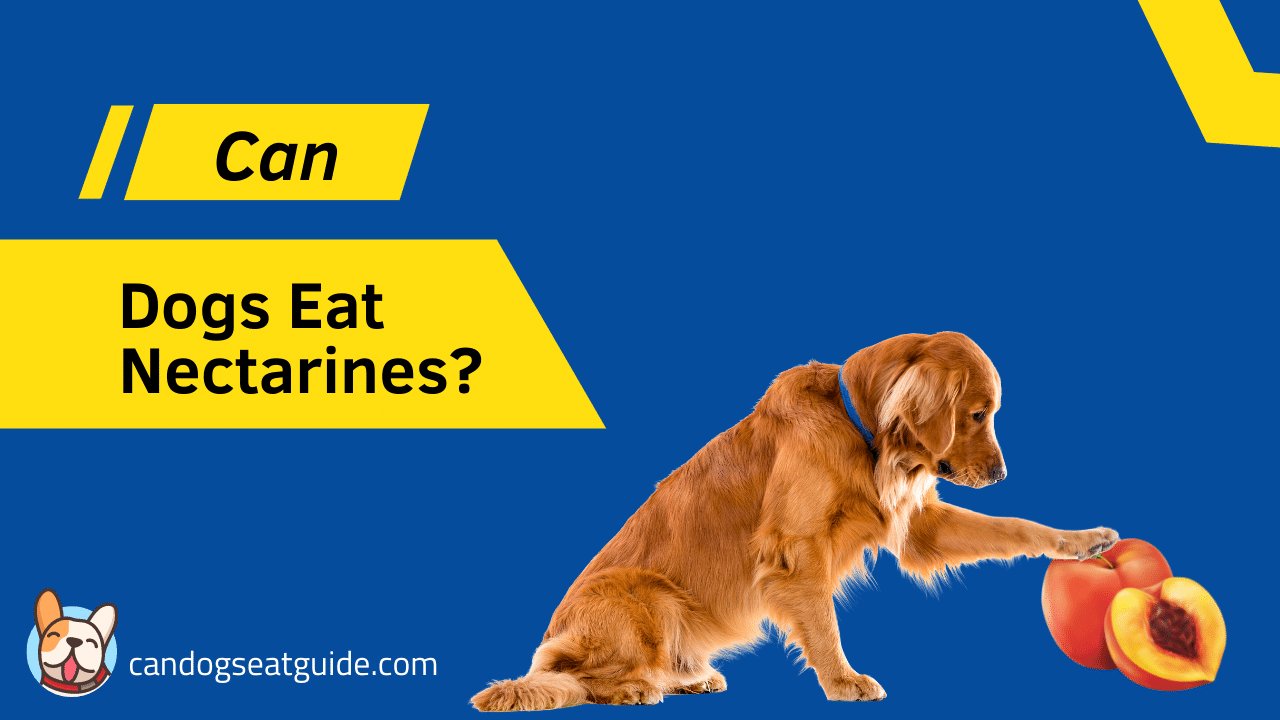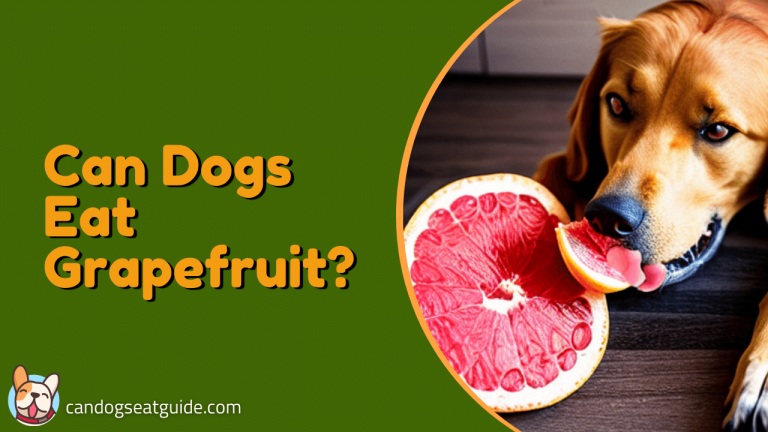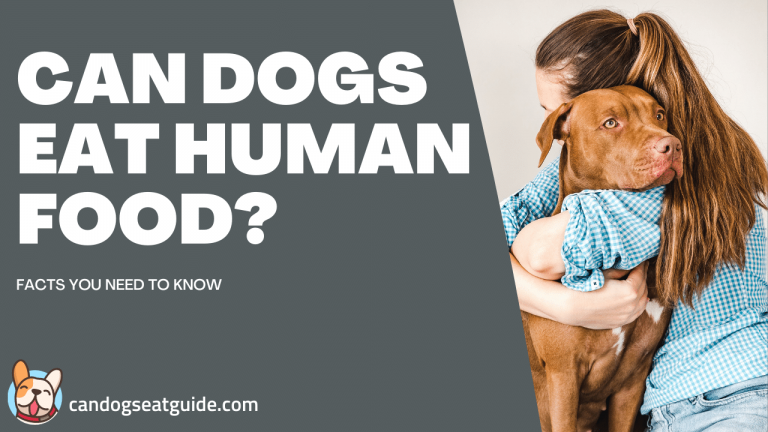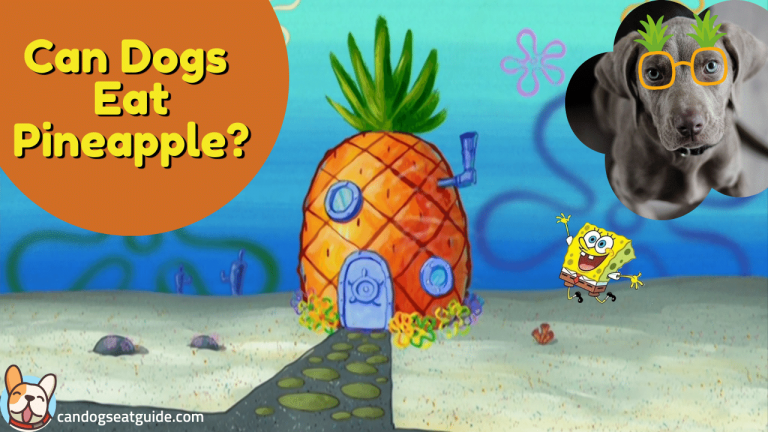I don’t about you but if I have to choose between peaches and nectarines, I will choose nectarines. And the reason for that is the fuzzy skin of the peach. I am not a fan of it but I still enjoy eating peaches too.
Now comes the time for our four-legged best friends and let’s see what they prefer but first let’s see if can dogs eat nectarines.
If you are wondering if dogs can eat peaches, you can check our guide.
What Are Nectarines? Differences Between Peaches And Nectarines
Nectarines were made by a peach but with a natural mutation, nectarines and peaches have only one visual difference and that is the skin. Peaches have fuzzy skin while nectarines’ skin is very smooth. That’s why nectarine was called the bare or the naked peach. Even their trees look exactly the same way.
Nectarines can get easily damaged and are smaller in size than peaches. The mutated fruit looks a bit redder but that is only because of the difference in the skin. The flesh of the nectarines can be white, yellow, or red.
Nectarines and peaches have different smells and flavors, too.
Nectarines appeared in China 2 000 years ago.
Can Dogs Eat Nectarines?
Yes, dogs can eat nectarines in moderation.
Nectarines are completely safe to be given to dogs but before feeding your dog nectarines you should wash well the fruit and remove the pit.
Amounts as with every other human food should be small and make sure that the pieces are bite-size.
Nectarines are a great source of vitamins and minerals. But they also contain a good amount of dietary fiber that is good for the digestive health of dogs.
Why Dogs Should Eat Nectarines? Nutrition Aspect
Nectarines are full of vitamins and minerals.
- Magnesium
Dogs need magnesium to help the absorbing process of vitamins and help produce the enzymes which are needed for a healthy digestive system.
- Potassium
Potassium is good for dogs’ nervous systems and also aids muscle functions.

- Vitamin A
A powerful antioxidant but also a fat-soluble vitamin. By the dog’s liver, vitamin A is transformed into beta-carotene.
- Beta-carotene
Beta-carotene is important for good vision and its efficiency of it can lead to night blindness.
- Vitamin C
Vitamin C is an antioxidant with anti-inflammatory properties. This vitamin can also help reduce cognitive aging. Dogs can synthesize Vitamin C in their liver but sometimes they need an extra amount.
Nectarines are also rich in dietary fiber.
- Fiber
The fiber that is present in nectarines can help for better digestive health and prevent digestive issues like constipation.
Why Dogs Should Avoid Nectarines?
Nectarines, like all other fruits, contain natural sugar. Some fruits like blueberries, raspberries, and papaya contain small amounts of sugar, but fruits like peaches and nectarines are rich in sugar. This sugar level makes them unsafe fruits for dogs with diabetes, obesity, or very sensitive stomach.
The next reason actually isn’t a reason why dogs should avoid nectarines it’s more like why dogs should avoid the pits of nectarines. The pits of nectarines contain cyanide. This toxin is present in the pit of peaches, and in the seeds of apples, and actually, it can be found easily in many fruits.
What is cyanide?
Cyanide is a toxin that can cause death in just a few minutes in our dogs.
How can dogs get cyanide poisoning?
Cyanide poisoning can happen when dogs eat the pit of nectarines, peaches, cherries, apricots, plums, etc. Even a tiny piece of the pit can lead to this poisoning. Unfortunately, in many cases, everything happens for minutes and the most common outcome is death.
Signs of cyanide toxicity:
- difficulty in breathing
- excessive salivation
- rapid breathing
- paralysis
You should call your vet immediately.
Health Benefits Of Feeding Your Dog Nectarines
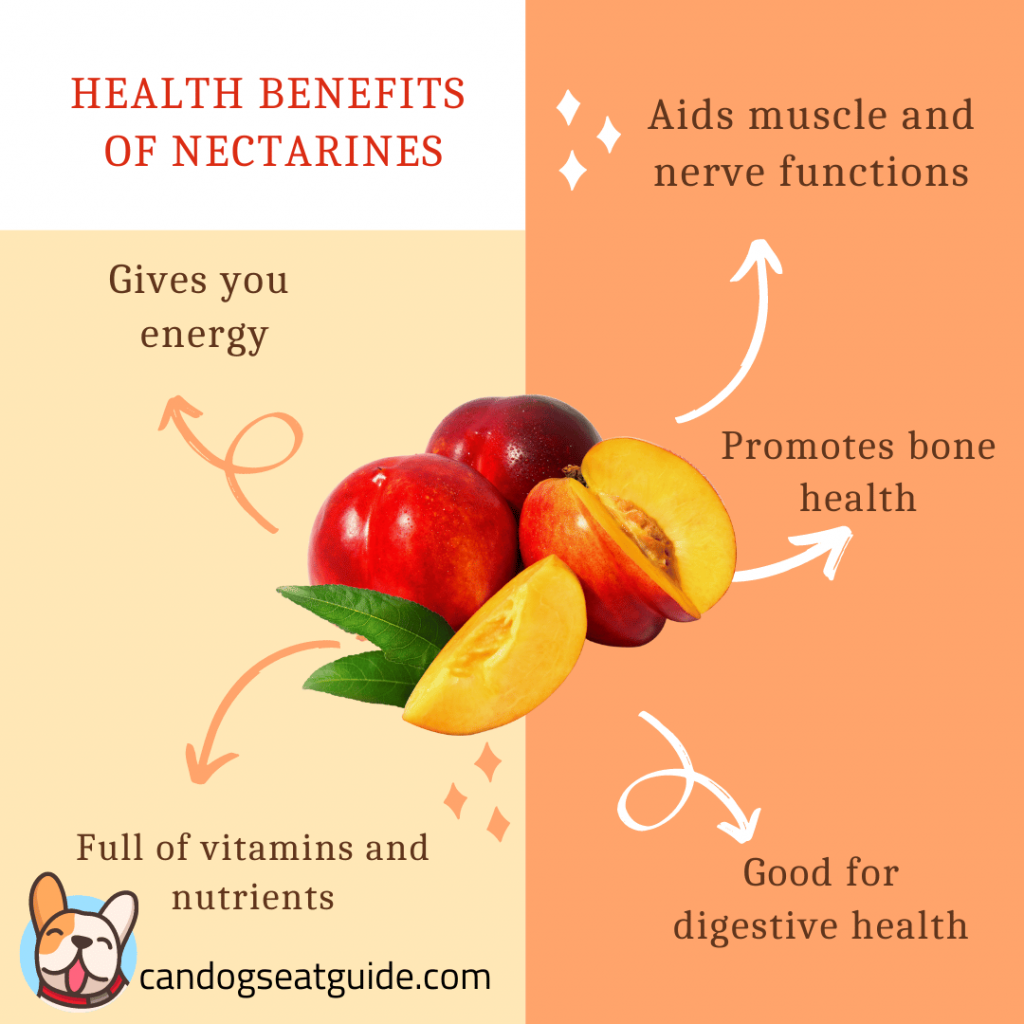
- Nectarines are great for the digestive health of dogs: Nectarines are rich in dietary fiber which prevents constipation and diarrhea and it’s great for dogs’ intestines.
- Helps good vision: The vitamin A that is later transformed into beta-carotene helps for good vision throughout the day and prevents night blindness.
- Rich in vitamins and minerals: Except rich in vitamin A, nectarines are rich in vitamin C, calcium, potassium, etc. All minerals and vitamins help the immune system to be strong.
Risks of Feeding Your Dog With Nectarines
- Cyanide poisoning: If your dog eats the pit of nectarine, you should call your vet immediately as this can end fatally.
- Rich in sugar: It’s not good to be eaten in large amounts or to be given to dogs with diabetes. Should be avoided from dogs with obesity or dogs that can easily gain weight.
- Choking hazards: The prices of nectarines should be cut into bite-size and pits should be removed as they can cause intestinal blockage.
- Rotten toxicity: You should always give your dog fresh fruits and in this case fresh nectarines. Rotten fruits are toxic to dogs and can cause ataxia, severe vomiting, and loss of muscle control.
How to Feed With Nectarines My Dog?
Before giving your dog nectarines you should do a few things:
- Wash and clean well the nectarine: You should be sure that all the pesticides and dirt are out of the nectarine skin.
- Remove the pit: It’s very important to remove the pit as it contains cyanide which is poisonous to dogs.
- Cut into small pieces: Pieces should be small, this way you will avoid choking hazards. Cut the nectarine into bite-sized pieces.
Can Dogs Eat Nectarines: Dog-Friendly Recipes
Grilled Nectarines With Greek Yogurt

Ingredients:
- 1 nectarine;
- 1/4 cup granola;
- 1 tbsp honey;
- 1/2 cup greek yogurt.
Steps:
- Preheat the oven to 400 degrees.
- Heat the grill pan before using it by placing it in the oven for 5-10 minutes.
- Cut the ripe nectarine in half, and take out the pit.
- Place flesh side down on the grill pan.
- Cook for 5 minutes.
- Remove from the oven.
- Top with a 1/4 cup of Greek yogurt.
- Sprinkle with granola and drizzle with honey.
- Serve and enjoy!
A Fruit Mix
Ingredients:
- 1 cup (8oz/120g) plain yogurt;
- 10 diced strawberries;
- 2 nectarines.
Instructions:
- In your dog treat mold or ice cube tray scatter in your strawberries and nectarines.
- Spoon over the yogurt. Fill evenly and smooth the top.
- Tap on the counter to ensure there are no air bubbles and the mixture is evenly distributed.
- Freeze for a minimum of 5 hours or overnight.
- To remove tap on the counter to loosen then turn out.
- Store in the freezer for up to 3 months.
Interesting Facts About Nectarines
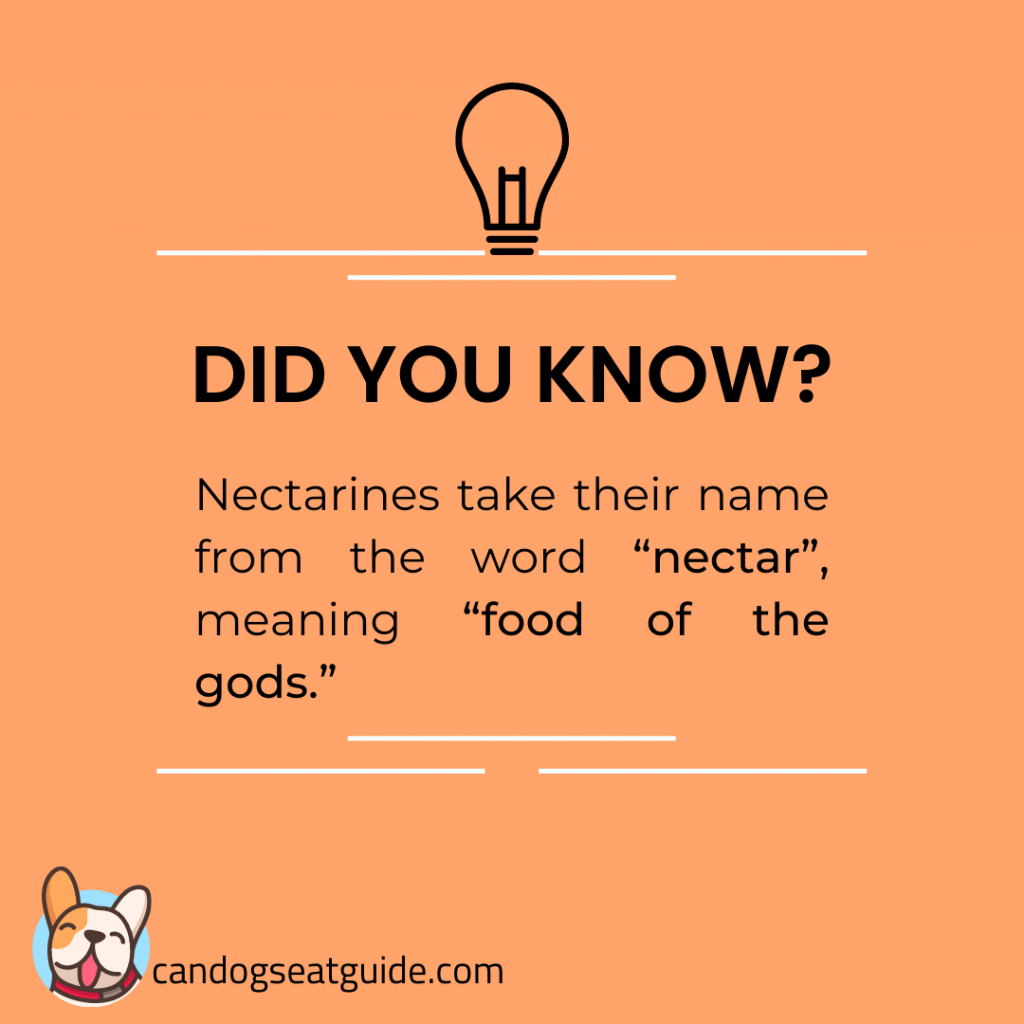
- Nectarines are part of the rose family.
- Nectarines take their name from the word “nectar,” meaning “food of the gods.”
- Nectarines and peaches have identical-looking trees.
- Like apples and bananas, they continue to ripen even after they are picked from the tree.
- Nectarines contain a bit more Vitamin C, more potassium, and twice the amount of Vitamin A than a peach.
Let’s wrap up!
Nectarines can be eaten by dogs but you should always check for any signs of not good reaction. Don’t forget that pits should be removed and the nectarine should be cut into small bite-sized pieces. Nectarines are fruits rich in vitamins and minerals which are good for dogs’ health and vision.
Have you ever given nectarines to your dog? Before doing it you should always consult with your vet.
Video Answer
FAQs
Can dogs eat canned nectarines?
Canned nectarines shouldn’t be given to dogs as they contain too much sugar or if they are sugar-free then they contain xylitol which is toxic to dogs.
Can dogs eat nectarine skin?
Dogs can eat nectarine skin, it’s easily digestible. But it should be washed well.
Can dogs eat nectarines that are rotten?
Dogs shouldn’t eat rotten nectarines or any other rotten fruits as they contain ethanol that is toxic to dogs.
Can dogs eat nectarines ice cream?
Dogs mustn’t eat any ice cream as it doesn’t have any nutritional benefits but also it can contain harmful ingredients.

